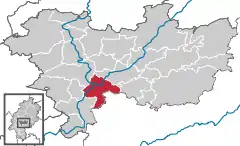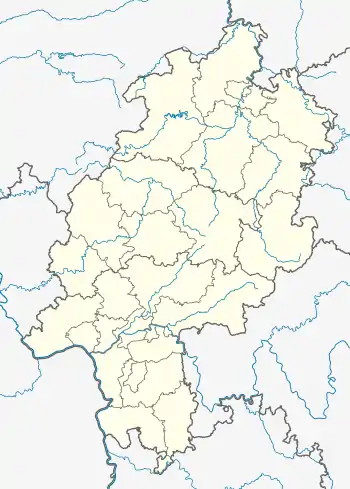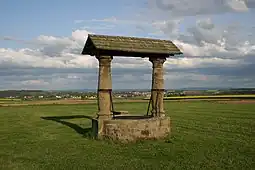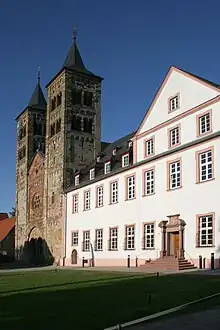Niddatal
Niddatal (German: [ˈnɪ.da.ˌtaːl] ⓘ) is a town in the Wetteraukreis district in Hesse, Germany. It is located on the river Nidda, 6 km southeast of Friedberg and 22 km northeast of Frankfurt am Main.
Niddatal | |
|---|---|
 Coat of arms | |
Location of Niddatal within Wetteraukreis district  | |
 Niddatal  Niddatal | |
| Coordinates: 50°17′54″N 8°48′50″E | |
| Country | Germany |
| State | Hesse |
| Admin. region | Darmstadt |
| District | Wetteraukreis |
| Subdivisions | 4 districts |
| Government | |
| • Mayor (2020–26) | Michael Hahn[1] (CDU) |
| Area | |
| • Total | 40.21 km2 (15.53 sq mi) |
| Elevation | 121 m (397 ft) |
| Population (2022-12-31)[2] | |
| • Total | 9,988 |
| • Density | 250/km2 (640/sq mi) |
| Time zone | UTC+01:00 (CET) |
| • Summer (DST) | UTC+02:00 (CEST) |
| Postal codes | 61194 |
| Dialling codes | 06034 |
| Vehicle registration | FB |
| Website | www.niddatal.de |
The town is divided into four districts: Assenheim, Ilbenstadt, Kaichen, Bönstadt.
History
Assenheim
Assenheim was first mentioned as a township in 1139. Assenheim Castle existed between the years 1170 – 1780. Its ruins are still visible today.[3]
Ilbenstadt
Ilbenstadt's first mention as an Eluistat was in 818. At the time, Ilbenstadt consisted of two cloisters.[4] Its Church St. Maria, Petrus und Paulus was elevated to Basilica Minor status in 1929 by Pope Pius XI.
Kaichen

Kaichen was founded by a Anshelmus de Cochene in 1231.[5] Around 1400, Kaichen's first church was built and rebuilt in 1737 and a baptismal font was added. One of the most popular places in Kaichen is the Gericht zu Kaichen which was a court able to declare to a death penalty.[5]
Bönstadt
Bönstadt first was the property of the counts of Falkenstein, and later of Isenburg-Büdingen, which made Bönstadt belong to Assenheim castle. Documentary, in former times Bönstadt had meant Benstad in 1184. In 1970, the townships of Assenheim, Ilbenstadt, Bönstadt and Kaichen merged to form modern-day Niddatal.[6] As of January 2009, the town's population stands at 9,360.[7] The area is characterised by agricultural activities, but in its former past, trade played a fundamental role in the local economy.[6]
Politics
Local elections in Niddatal have yielded the following results:
| Parties | % 2016 |
Seats 2016 |
% 2011 |
Seats 2011 |
% 2006 |
Seats 2006 |
% 2001 |
Seats 2001 | ||
|---|---|---|---|---|---|---|---|---|---|---|
| CDU | Christian Democratic Union of Germany | 30,1 | 9 | 39,7 | 12 | 42,3 | 13 | 39,9 | 12 | |
| SPD | Social_Democratic_Party_of_Germany | 44,6 | 14 | 35,5 | 11 | 37,1 | 12 | 35,9 | 11 | |
| GRÜNE | Alliance_90/The_Greens | 8,6 | 3 | 15,5 | 5 | 7,2 | 2 | 8,5 | 3 | |
| FWG | Freie Wählergemeinschaft Niddatal (Free Voters Niddatal) | — | — | 7,7 | 2 | 9,1 | 3 | 15,7 | 5 | |
| FDP | Free_Democratic_Party_(Germany) | 11,5 | 3 | 1,6 | 1 | 4,3 | 1 | — | — | |
| LINKE | The Left (Germany) | 5,2 | 2 | — | — | — | — | — | — | |
| Total | 100,0 | 31 | 100,0 | 31 | 100,0 | 31 | 100,0 | 31 | ||
| Turnout in % | 56,9 | 49,0 | 47,2 | 56,6 | ||||||
Sights
Ilbenstadt

Basilica Maria St. Petrus und Paulus was donated by St. Gottfried von Cappenberg in 1123. St. Cappenberg was interred there in 1127 and Pope Pius XI elevated the Church to Basilica Minor status in 1929.[8] Due to secularization in 1803, its cloister was abrogated. After World War II, the Roman Catholic Diocese of Mainz repurchased the cloister from the state Hesse.[8]
Today the church is a landmark of Ilbenstadt which is also visible because of the eternalisation on town emblem. Regionally, the church is also known as Dom der Wetterau (cathedral of Wetterau)
References
- "Ergebnisse der letzten Direktwahl aller hessischen Landkreise und Gemeinden" (XLS) (in German). Hessisches Statistisches Landesamt. 5 September 2022.
- "Bevölkerung in Hessen am 31.12.2022 nach Gemeinden" (XLS) (in German). Hessisches Statistisches Landesamt. June 2023.
- Stadt Niddatal. Niddatal.de. Retrieved on 5 January 2014.
- Stadt Niddatal. Niddatal.de. Retrieved on 5 January 2014.
- Stadt Niddatal. Niddatal.de. Retrieved on 5 January 2014.
- Stadt Niddatal. Niddatal.de. Retrieved on 5 January 2014.
- Stadt Niddatal Archived 14 June 2018 at the Wayback Machine. Niddatal.de. Retrieved on 5 January 2014.
- "Ilbenstadt, Basilika Maria, St. Petrus u. Paulus". Archived from the original on 15 October 2008. Retrieved 8 July 2007.